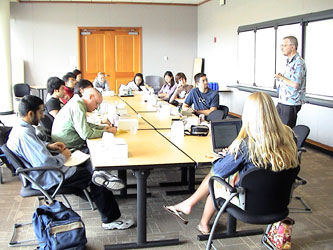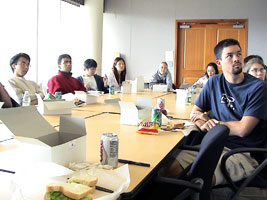Bill Hodgkiss Explains Fine Points about Applying to Graduate School
7.13.04 -- At the undergraduate researcher scholars' second event in late June, Bill Hodgkiss described his experience as a faculty member evaluating graduate school applications. Hodgkiss is the newly appointed associate director for homeland security in the UCSD division of Calit² and a professor of Electrical and Computer Engineering and at the Scripps Institution of Oceanography (SIO). While working at SIO, Hodgkiss has reviewed years of applications. So, from experience, he had very insightful advice for the undergrad scholars.
|
According to Hodgkiss, there are four main components that determine a student's ability to gain entry to graduate school. Each student needs to provide a transcript with a competitive grade point average from his or her undergraduate career, good scores on the Graduate Record Exam, at least three strong letters of recommendation, and a clearly articulated personal statement. He placed emphasis on the importance of the personal statement and the letters of recommendation. "What can make the difference between acceptance and rejection, though," said Hodgkiss "is whether the student personally meets the faculty members who may champion support.
"In your personal statement, skip the philosophy and get to the point of your interest," emphasized Hodgkiss. "Showing how you are different from everyone else is important. If you can accomplish that in your statement, then your application will stand out."
Another way that students can stand out is by demonstrating pervious research experience. This makes them seem more experienced and knowledgeable then other applicants. "When a student has had research experience, we notice," Hodgkiss said. Luckily, a summer of hands-on research will distinguish the undergrad scholars at Calit².
Letters of recommendation are another important component in the application process. During his comments, Hodgkiss noted that it is important to select letter writers who know and have interacted with the student. This way, they can say something meaningful about him or her.
"Allocate a good portion of your time to talk with potential advisors," said Hodgkiss. "Find out about their research. Tell them what your research interests are. Remember, they're always on the lookout for students who may fit into their research programs. If they find a fit, they may champion your application."
|
One student jokingly asked, "What if we want to meet with people at a school across the country?" Hodgkiss' answer was direct: "Get on a plane and go meet them!" Clearly, the more effort students exert on trying to make contacts, the better their chances of standing out and being selected.
Overall, Hodgkiss focused on how important it is to distinguish one's application from others. Since the undergraduate scholars will have research experience at the end of the summer, they will have a great advantage. And, since those applying for graduate school will be competing with people from the best schools in the nation, they will need all the advantages they can get.
- Submitted by Valerie Tukey, Calit² communications intern.



